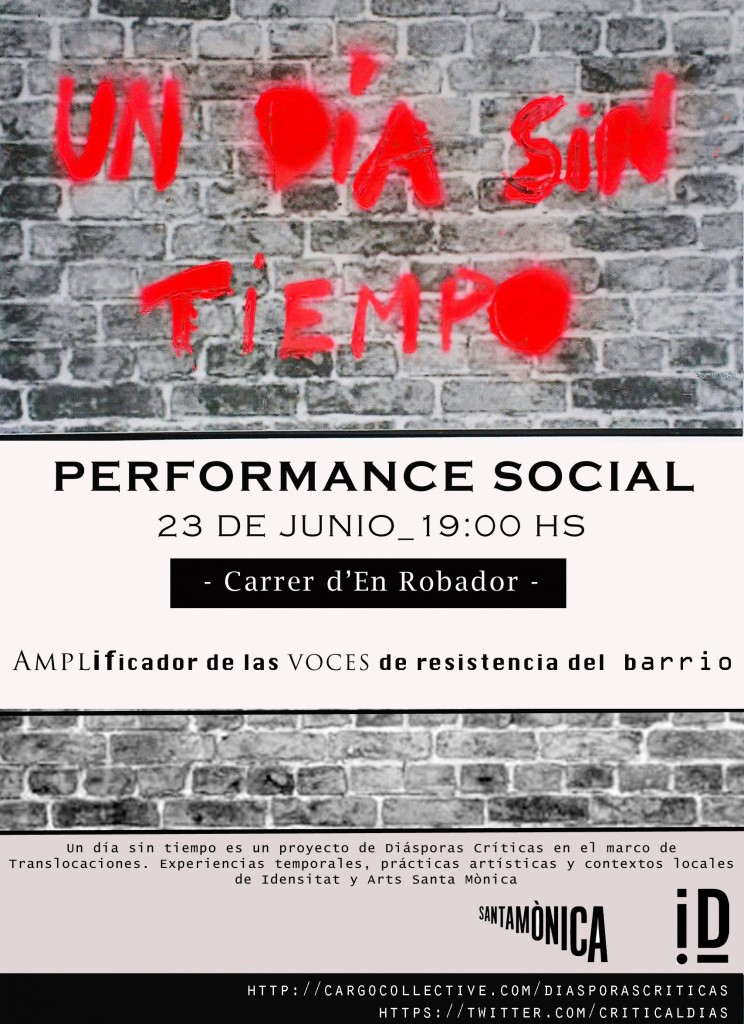 Hoy es el día más largo.
Hoy es el día más largo.
Ni pasado ni futuro ni frontera ni país.
Hoy se supera, se extiende la auto-representación con la producción colectiva.
Hoy es el apocalipsis anti-moral.
Hoy es un día sin tiempo.
—-
Un día sin tiempo una performance-social concebida como un acto poético en resistencia a las políticas de limpieza social y vigilancia policial del barrio del Raval.
Un día sin tiempo es el producto de un proceso de investigación -acción, talleres y lectura de Diasporas críticas en colaboración con el Espai del Inmigrante y Radio Nikosia y activistas del barrio.
Un día sin tiempo denuncia el racismo institucional a través de los lenguajes y estrategias de las luchas feministas, decoloniales y contrapsiquiátricas.
Manifiestos y poesía desde los balcones del Carrer d’En Robadors
23 de junio de 2015, a las 19.00 hs
A day without time
Diásporas criticas, 27 June 2015.
Death will come and it will have an anti-disturbance uniform.
(Blanca Haddad)
Last Tuesday we were on Robadors street in Raval with around 60 people – friends, collaborators, curators, neighbours and activists implicated in the project – to see the culmination of the project A Day Without Time.
A Day Without Time was proposed as a means of constructing links between feminist struggles, with the sex workers at the front line, and seeking alliances with migrant, anti-racist and anti-psychiatric movements that form part of the map of resistances of Raval. The objective was to open a space of listening and dialogue to counter the neoliberal attempts to erase the collective memory of the neighbourhood.
We organised workshops and meetings, went to assemblies and held discussions with neighbours and workers on the street over 5 months.
As we know from the feminist struggles, various groups feel threatened when people begin to talk, share and exchange strategies of resistance. Taking the struggles out of the drawers where they have been archived and listed in order to activate and visibilize a translocal and transversal political memory is extremely dangerous: for police mafias, for hotel and property mafias and for the street mafias that operate there.
Mafias machistas
Calle Robadors is a territory traversed by various mafias, all of which are machistas. And as the lawyer Silvia Villullas mentioned in her description of the events, they did not like to see so many women taking the street to speak.
Despite the police permission to hold the event (secured by Ars Santa Monica museum) on Tuesday 23rd June at 19.30 during the readings a series of disruptions were coordinated. They began with racist and lesbophobic comments and ended with threats and physical violence. Someone threw a glass bottle filled with red pepper, injuring one of our friends and collaborators. First violence: the skin injured. The face broken.
Second violence: A mass of police vans arrived that were completely disproportionate to what had happened: 6 or 7 cars and 2 riot control vans. A street cleaner cleared evidence and not one officer tried to gather information about what happened. The police know exactly how to interrupt, frighten, avoid, manage, repress, cut, silence.
“It was mild”
According to the medical report our friend’s wound was ‘mild’. This wound is not mild or light or insignificant. It is grave. It is grave because it is not isolated. Nor is it an exception. Police violence and racial and sexual surveillance form part of the gentrification of Raval and it is coordinated by various police and para-police mafias operating in Barcelona. It is grave and reveals the grades of violence of a power that seeks to isolate and break and erase forms of life.
Then there was the cloudy discourse: a web of comments suggesting that this is what is expected in this street. Fingers wag from one side to another: “You have provoked this violence”.
Third violence: we shouldn’t take the street. Sex-workers shouldn’t speak. Arabic shouldn’t be heard so loud. A trans body should not be shown from a balcony. Police violence should not be denounced. You shouldn’t occupy public space. You shouldn’t. You shouldn’t.
Provocation and the logic of the miniskirt
Of course this reminds us of the machista slogan according to which if a woman wears a miniskirt and is raped “she asked for it”. In the face of this violation we often only manage to say, “how awful”, “that’s terrible”, “I hope she’s ok”.
Our supposed provocative miniskirt was resistance to misogyny, homophobia and racism. Our miniskirt is not a miniskirt but a manifesto read out loud, a poetic-political text read from a balcony.
Twisting the logic of “provocation by miniskirt”, we follow Virginie Despentes and others who recognise the risks and encourage us to take them, not as a choice but because they form an inherent part of living as people who practice discordance with persecution and surveillance, gentrification and silencing, incarceration, racism, violence, exclusion, erasure, eviction, pathologization, humiliation and stigmatization.
The process, the conversations, the meetings, the encounter is already underway.
Diásporas Críticas
https://twitter.com/criticaldias
http://cargocollective.com/diasporascriticas